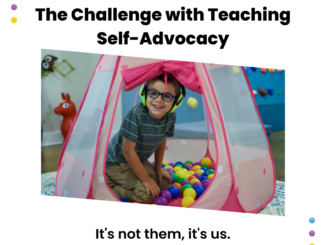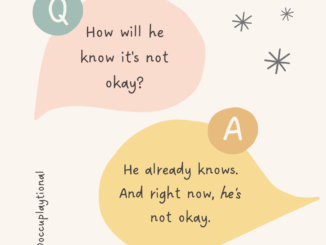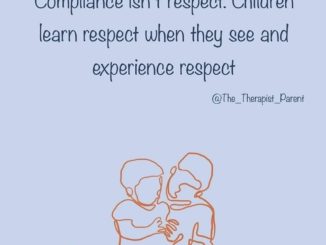I posted last week about the overuse of the word “listen” to mean “obey” in adult/child relationships — i.e., “you’re not listening to me” when what the adult really means is “you’re not complying with what I told you”, not, “your ears are not processing the language I’m saying.”
A lot of people in the comments asked me for alternatives and it honestly baffled me a little bit because I don’t feel like I just say the same thing but use a different word. I simply don’t have any need to say “you’re not listening” or “listen” at all in my day to day, but I wasn’t sure why.
After observing myself, I’ve noticed that one of the reasons why is how often I rely on touch/tactile cues, or visual cues, as a way to cue my kids to things that I want or need them to do. Whereas giving them directions that i say out loud would be a verbal or audio cue, and verbal cues often kick off arguments when my kids are feeling tired or frustrated or low on control or like they need to assert their developmentally appropriate independence.
If I say “it’s time to brush your teeth” at the end of a long day, both my exhausted kids are likely to reflexively say, “No!”
If I hold up a toothpasted toothbrush in their direction, they’re much more likely to take it and begin brushing. Or if I make it do a wiggly dance in the air, or pretend to crawl toward them making animal noises or car noises…
Of course there are still times when they see the toothbrush and yell “I don’t want to brush my teeth!” And then we work it out. Maybe they need cuddles for a bit first. Maybe we rearrange the order of steps toward bedtime and do everything else first. Maybe I brush them for them. Maybe I trade off with Dad who is usually more well-received as he’s the preferred parent. 😉
If I need my child to put on a pair of pants so we can leave the house, I tell them, “I’m gonna help you change pants” (so I’m not just undressing them out of the blue) and then I begin to physically undress them. If they’re focused on something they’re playing with they might not notice I need them to step a foot into their pant leg. Sometimes I say “hey step your foot in!” Often if I do, my kid will say “in a minute!”
Sometimes I just tap their leg gently with my hand. That’s a tactile cue. And either way—audio cue or tactile cue—I’m prepared to be patient and let them move at a child’s pace, not expect an adult pace. I plan the amount of time into our routine that it takes children to do these things, not the amount of time it would take a motivated adult.
I also just ask myself a lot whether the thing we’re doing, or I’m trying to get them to do, is important to *me* or to *them*. If it’s important to me, I don’t expect them to be inherently motivated to get the steps of it done or whatever. The most common ones here are “leave the house” and “bedtime routine”. My kids may or may not care about whether they have on clean pants and socks and appropriate shoes for our outing. I’m the one who cares about that, so I consistently expect to be the one actually dressing them, even though they’re physically capable of putting clothing on their body. I’ll continue to do that until whatever point they are no longer interested in that help.
And then if I say something and I think “they’re not listening” as in they’re not hearing me, I’ll just do steps to be heard. Move closer to them, crouch down on eye level, realize that they’re watching a show or building a tower and their focus is on that and they didn’t hear me, tap them on the shoulder, say their name in a silly voice…whatever it takes while waiting until I actually have their attention, and then repeat whatever it is I needed to say.
I know my focus doesn’t snap to whoever speaks to me most of the time if I’m focused on something and not afraid of the person talking to me—i.e. i trust them to be patient and wait for my focus for a sec so fear/anxiety/nervousness doesn’t override my focus. And I definitely don’t want my kids to feel that way about me, so I expect their focus to go at a child’s pace, too. Plus, let’s be honest. I’m often just not as interesting as their play! I come down into their magical and imaginative world bearing news of clean underwear or shoes or an available sandwich. It makes sense that they don’t snap to me right away. 😉
These things are really things I’m talking about in a parenting context. If I were trying to get the attention of a whole classroom full of students all doing individual things and I said “Hey guys, listen up!” That’s not the kind of thing that I’m talking about when I talk about the word “listen” being used as a euphemism, because in that case you’re being literal—you do in fact actually need everyone to begin to tune in to what your voice is saying!
On the flip side, if you’ve given directions to the whole class and one lil guy is still wandering around a bit lost and you announce to him “You’re not listening to me,” you might be slipping into the euphemistic use of it again, because he might very well have heard you but just be unsure of how to initiate the task you asked him to do, or be thinking about his own idea, or whatever, and what you really mean is “You’re not doing what I asked you to do”.
There’s a lot of reasons why I’m not a classroom teacher and my inability and lack of desire to deal with many many kids at once is doubtlessly one of them, but if it were me in that scenario, I might say “Hey bud, whatcha doing? … What’s everybody else doing? … Let’s go do that!” or “Hey, [name], it’s time to get your science journal out” or whatever depending on circumstances and specifics. I just never find “Hey you’re not listening to me right now” to be helpful in providing actual instructions or steps forward. All it does is be like “hey freeze and feel shame” and that just feels unhelpful.
I read a post one time that was talking from an emergency responder perspective. They said that frequently average people will be in a little bit of a daze or have a little bit of tunnel vision while they try to help in an emergency, which might lead to situations where the professional, the emergency responder, says something like, “Can you go get him some blankets and call 911?” Then the person will come back and hand him blankets and be like, “I got you the blankets.”
The original speaker described how it is *immensely* more useful to reply “Thank you! Now can you call 911,” as opposed to, “I also told you to call 911” or “Did you call 911?” or anything else to that effect—any sort of correction or insistence that they did it wrong by not following all the directions. All that does is instigate an argument or shame or embarrassment or further throw the person out of whack who’s just trying to help.
If we assume that kids are trying to do the best that we can, then why would “you’re not listening” be a helpful thing to say, assuming that *we also* want the kid to do the best they can? Does anybody do better at working toward a collaborative goal when someone is snapping at them or pointing out their faults in an accusatory way?



